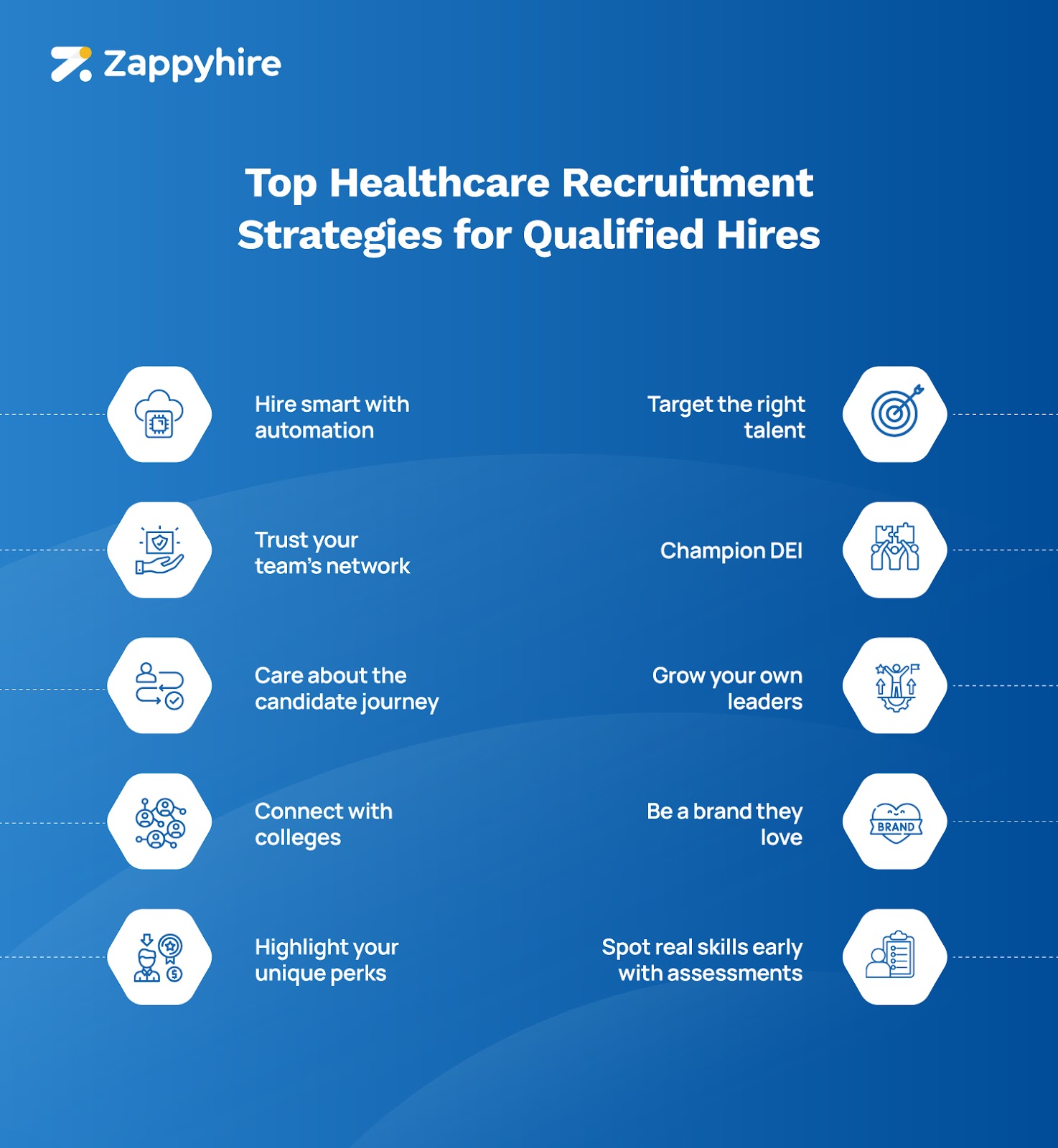
Finding and hiring the right people is no small feat, especially in healthcare where every hire directly impacts lives.
You’re not just looking for skilled professionals – you’re seeking those with the compassion to comfort, the resilience to endure, and the dedication to excel in high-stress situations.
According to a US Healthcare Labor Market report, the need for healthcare workers, particularly in lower-wage roles, is expected to grow significantly, with a projected shortfall of more than 3.2 million workers by 2026.
As healthcare demands surge, the pressure to secure top talent intensifies.
So how can healthcare organizations not just attract, but keep the best of the best?
Let’s take a look at the top recruitment strategies in healthcare that make a real difference.
Recruitment and retention strategies in healthcare – why it matters
The healthcare industry is facing a serious challenge. A shortage of workers in low-wage healthcare roles is expected, with demand far outpacing supply.
Mercer’s report on the US healthcare labor market shows that by 2026, the U.S. will need 10.7 million workers in these roles, but there will be a gap of over 3.2 million. States like New York and California will be hit the hardest.
This labor shortage isn’t just about numbers. The retirement of primary care physicians is on the rise, and the demand for care is shifting to nurse practitioners and physician assistants.
But even with these shifts, the demand for registered nurses is climbing, with a projected deficit of nearly 100,000 by 2026.
Mental health care is another critical area. As demand increases by 10%, the shortage of mental health workers will leave tens of thousands of jobs unfilled.
So, what does this mean for recruitment in the healthcare industry? One thing’s for sure – healthcare organizations need to rethink their strategies to attract and retain talent.
Top recruitment strategies for healthcare organization
In the face of these challenges, the right recruitment strategies in healthcare can make all the difference in keeping the industry thriving.

Digitalize and automate recruitment processes
Manual processes can slow down recruitment, especially in the fast-moving healthcare industry.
With the projected demand for mental health workers and the urgency to fill these roles, automated tools can significantly speed up the hiring process and improve candidate engagement.
These talent acquisition tools automate repetitive tasks like resume screening and interview scheduling, freeing up your HR team to focus on strategic activities, not to mention the drastic reduction of bias with automated video interview solutions.
| 💡 Recommended Article How One-Way Video Interviews Prevent Bias in Hiring |
Automation in the recruitment process can also enhance candidate engagement through personalized communication, improving the overall candidate experience.
With recruitment automation, you not only speed up hiring but also increase the chances of securing top talent before they move on to other opportunities.
Engage in targeted healthcare recruitment marketing
Healthcare professionals often frequent specific online communities, job boards, and industry conferences.
As certain regions, particularly the US’ Northeast, face significant retirements among primary care physicians, targeted best practices in healthcare recruitment marketing efforts in these areas are essential to fill the resulting vacancies.
By targeting your recruitment efforts in these places, you increase your chances of connecting with qualified candidates.
Consider creating specialized content that speaks directly to these professionals, such as social media campaigns highlighting your organization’s achievements, or even hosting webinars on topics relevant to potential hires.

Prioritize employee referrals
Your current employees are often your best ambassadors, and they likely know other professionals in the field who would be a great fit for your organization.
With the expected shortages in states like Pennsylvania and North Carolina, where demand for registered nurses will exceed supply, tapping into employee networks could be a strategic way to bridge these gaps.
By creating a structured referral program with incentives, you encourage your staff to recommend qualified candidates.
This not only speeds up the hiring process but also tends to result in higher-quality hires, as employees typically only refer individuals they believe will succeed in the role.
Invest in diversity and inclusion initiatives
DEI (diversity, equity and inclusion) is more important than ever, and a diverse workforce brings a range of perspectives, experiences, and skills that can lead to better problem-solving and decision-making.
A report by National Center for Health Workforce Analysis states that some states (like Vermont, Maine, Rhode Island, West Virginia, Alabama, Pennsylvania, Connecticut, and New Hampshire) in the United States are projected to have an excess of registered nurses by 2030.
To make the most of this surplus, organizations should ensure their healthcare recruitment strategies are inclusive, tapping into diverse talent pools to fill roles across the country.
To attract a diverse pool of candidates, ensure that your recruitment practices are inclusive. This could involve reviewing job descriptions to eliminate biased language, actively seeking out candidates from underrepresented groups, and providing diversity training for your hiring teams.
| 💡 Recommended Article 9 Diversity Hiring Strategies to Build an Inclusive Workplace |
An inclusive workplace not only attracts top talent but also enhances employee satisfaction and retention.
Pay attention to candidate experience
The candidate experience during the recruitment process can make or break your ability to attract top talent.
In healthcare, where professionals are often juggling multiple job offers, a smooth and positive recruitment process is essential.
With the projected shortage of 510,000 mental health workers by 2026, creating a seamless and attractive candidate experience can make a significant difference in securing these critical roles.
So make sure that your hiring process is transparent, timely, and respectful of the candidate’s time.
Communicate at each stage, provide feedback promptly, keep improving the candidate experience and make sure that your candidates feel valued and respected throughout the process.
| 💡 Recommended Article How to Enhance Candidate Experience with Pre-Recorded Video Interviews |
Promote internal talent
Promoting from within not only motivates your current employees but also ensures that you retain institutional knowledge and maintain continuity.
As healthcare organizations face the challenge of filling critical roles, particularly with anticipated retirements among primary care physicians, promoting from within can ensure leadership continuity and organizational stability.
When employees see a clear path for career advancement within the organization, they are more likely to stay engaged and committed.
So, it’s best to regularly evaluate your team for potential leaders and invest in their development through training and mentorship programs.
Collaborate with colleges
Building relationships with colleges and universities is a proactive way to create a pipeline of fresh talent for your organization.
You can gain early access to graduating students and even influence curriculum development to better align with industry needs.
Consider offering internships, scholarships, or mentorship programs to attract students and help them transition smoothly into the healthcare workforce.
These partnerships not only provide a steady stream of qualified candidates but also position your organization as a leader in nurturing the next generation of healthcare professionals.

Project a strong employer brand
Your employer brand is your reputation as a place to work.
In healthcare, this brand is especially important because professionals often seek out employers that align with their values, such as patient care, innovation, and community impact.
To build a strong employer brand, focus on highlighting what makes your organization unique.
Showcase your commitment to employee well-being, opportunities for professional growth, and your role in advancing healthcare.
Share stories and testimonials from current employees to give potential hires a genuine glimpse into your work environment.
| 💡 Recommended Article Employer Branding – Everything You Need to Know (Infographic) |
Offer a solid EVP
Your Employee Value Proposition (EVP) is the unique set of benefits and values that employees receive in return for the skills and experience they bring to your organization.
A strong EVP goes beyond perks, compensation or benefits, encompassing aspects like company culture, career development opportunities, work-life balance, and the overall mission of the organization.
In light of the expected shortages in critical roles, particularly in mental health and nursing, a compelling EVP that addresses the specific needs and aspirations of healthcare professionals can be a powerful tool for attracting and retaining top talent.
| 🎥 Recommended Watch How Organizations Can Create a Strong & Compelling Employee Value Proposition | Rakesh Rajan | S3.E1 |
Evaluate thoroughly using skills assessments
Skills assessments should be integrated into the beginning stages of your hiring process to quickly identify candidates who possess the technical proficiency and soft skills needed for success.
These assessments allow you to measure both clinical capabilities and critical traits like empathy, decision-making, and adaptability – qualities that are vital in high-pressure environments.
As the healthcare industry faces projected shortages in areas such as registered nursing and mental health, using skills assessments early ensures you’re focusing your time and resources on the most qualified candidates from the start.
Whether it’s through scenario-based simulations or behavioral assessments, evaluating early helps to streamline your hiring process and guarantees that the professionals you bring on board can meet the demands of their roles.
Incorporate these recruitment and retention strategies in healthcare to secure the future of patient care
As the industry grapples with worker shortages and an ever-increasing demand for services, organizations MUST adopt innovative recruiting strategies for healthcare professionals to attract, engage, and retain top talent.
Your team is your most valuable asset. Make sure they feel empowered, valued, and ready to deliver the high-quality care that patients deserve.




